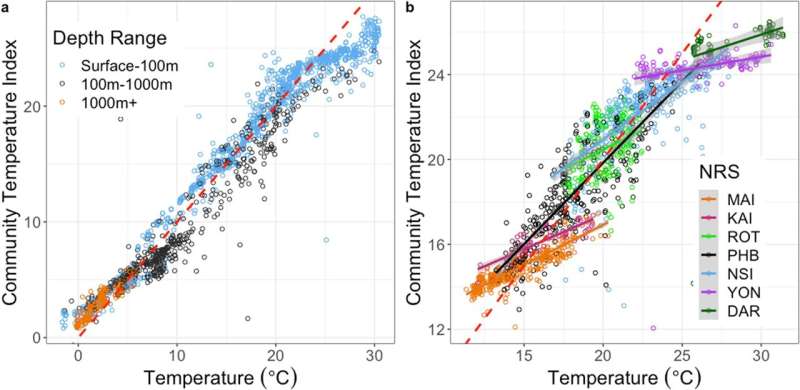This article has been reviewed according to Science X's editorial process and policies. Editors have highlighted the following attributes while ensuring the content's credibility:
fact-checked
trusted source
proofread
Study shows marine heat waves have significant impact on microorganisms

A new study led by Australia's national science agency, CSIRO, shows that marine heat waves (MHWs) are altering the microorganism communities that form the base of the marine food chain, disrupting coastal ecosystems. The article "A marine heat wave drives significant shifts in pelagic microbiology" was published in Communications Biology.
Australia has recently experienced a number of marine heat waves off the East Coast and Tasmania. They are prolonged oceanic warm water events that can have significant impacts on marine life, including fish, coral reefs and kelp forests. MHWs can be caused by a range of factors, and large climate drivers such as El Niño are known to impact their frequency, intensity and duration.
Lead author Dr. Mark Brown said the researchers analyzed an MHW off Tasmania in 2015/16, an extreme warming event, finding it had significant impacts on microorganisms.
"The marine heat wave transformed the microbial community in the water column to resemble those found more than 1000 km north, and supported the presence of many organisms that are uncommon at this latitude," Dr. Brown said.
"This reshaping leads to the occurrence of unusual species, the development of unique combinations of organisms, and can cause cascading effects throughout the ecosystem, including changes in the fate of carbon sequestered from the atmosphere.
"For instance, we observed a shift away from the normal phytoplankton species at this site towards smaller cells that are not easily consumed by larger animals, potentially leading to profound changes all the way up the food chain."
The study is the result of a long-term effort to observe marine microbiota for over 12 years.
CSIRO principal research scientist Dr. Lev Bodrossy said researchers used a new approach to simplify the way they observed tens of thousands of marine microbes.
"This will enable us to evaluate the health of the marine ecosystem and predict how it will change with predicted global warming," Dr. Bodrossy said.
"We'll be able to better predict the future of fish stocks and marine carbon sequestration in different regions of the global ocean.
"Observations like these, especially those done in the open ocean, are difficult to sustain but are crucial for understanding and forecasting the future status of the marine ecosystem," he said.
More information: Mark V. Brown et al, A marine heatwave drives significant shifts in pelagic microbiology, Communications Biology (2024). DOI: 10.1038/s42003-023-05702-4
Provided by CSIRO


















